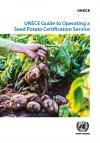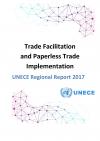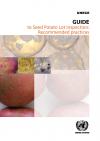Search
Displaying Results 61 - 80 of 270
- English
Gender Responsive Standards publication (ECE/TRADE/445) makes the case for mainstreaming gender in the development and implementation of standards. The first chapter places the discussion in the larger perspective of how standards contribute
- English
Since 2010, the UNECE has been undertaking demand-driven national studies of regulatory and procedural barriers to trade, with a view to: helping countries achieve greater regional and global economic integration; informing donors as to where assistance might be required; and, supporting policy
- English
This Glossary (ECE/TRADE/377/Rev.2) represents an English-Russian-Chinese dictionary of terms that are widely used in trade facilitation. This is the third, revised and completed edition including new terms in trade facilitation and
- English
Streamlining border crossing and helping traders to access international markets can provide significant stimulus to national economies and directly supports the implementation of UN Sustainable Development Goal (SDG) 17, specifically on promoting a universal, rules-based, open, non-
- English
Public procurement alone represents 15-20% of the global GDP, while procurement commitments under the World Trade Organization’s Agreement on Public Procurement (GPA) have been estimated at around EUR 1.3 trillion. This is enormous purchasing power that can drive investment and innovation
- English
This guide (ECE(TRADE/434) has been developed to assist Certifying Authorities (CAs) in the operation of their seed potato certification service and to encourage standardisation in the operation of seed potato certification services between CAs. The guide is also intended to assist countries that
- English
This publication (ECE/TRADE/444) presents the results of an ongoing research on the practical experience of regulatory authorities, governments and local administrations, as well as regional groups of countries, in using standards
- English
Since 2010, the ECE has been undertaking demand-driven national studies of regulatory and procedural barriers to trade, with a view to: helping countries achieve greater regional and global economic integration; informing donors as to where assistance might be required; and supporting policy
- English
This Publication (ECE/TRADE/440) advocates for integrating education about standardization into the curricula of educational establishments. It presents evidence of the relevance of standards for policymakers and business executives as well
- English
This Guide (ECE/TRADE/441) is a practical tool to help trainers in the preparation, delivery and follow up to a set of training workshops.
Both this guide and the workshop materials have been prepared by the UNECE Secretariat,
- English
The Economic Commission for Europe (UNECE) has a long history of offering trade facilitation guidance, especially on the topic of Single Window. Since its emergence in 2004, Recommendation 33 on implementing a Single Window has been widely received as the reference on the subject and is used as
- English
As the second most polluting industry, the textile sector is responsible for a large portion of the world’s CO2 emissions and industrial waste, not to mention the exploitation of “indecent” working conditions. At the same time, the industry has a complex value chain, with production facilities
- English
Within the United Nations Economic Commission for Europe (UNECE), the United Nations Centre for Trade Facilitation and Electronic Business (UN/CEFACT) has developed a series of some 30 recommendations and standards that are used worldwide to simplify, standardize and harmonize trade procedures
- English
Since the introduction in 1973 as the UNECE Recommendation No. 1, the UN Layout Key (UNLK) has provided Governments, organizations and the business community with a basis for a standard and aligned design of documents used in trade and transport. This has led to a major improvement in the
- English
Recommendation 42 on Trade and Transport Facilitation Monitoring Mechanisms (TTFMM) addresses issues related to institutional arrangements and methodology in designing and implementing TTFMM. It is an important contribution to UNECE’s suite of Trade Facilitation recommendations and guidance
- English
The Explanatory Brochure on the Standard for Sweet Peppers has been developed to harmonize the interpretation of the Standard, thereby facilitating international as well as national trade. It addresses producers and traders, as well as inspection authorities. It corresponds to the latest edition
- English
Facilitating trade is about streamlining and simplifying international trade, particularly import and export procedures, transit requirements and procedures applied by Customs and other agencies (UNECE-UN/CEFACT). With the rapid increase of international trade, thanks in part to the reduction of
- English
A small landlocked country, the Republic of Moldova remains one of the poorest countries in South East Europe, with the economy showing continued dependence on low value-added manufacturing and agriculture along with remittances from workers abroad for income generation
- English
Public-Private Partnerships (PPPs) is a possible solution for financing and implementing public projects. These projects allow the public sector to benefit from private sector funding, expertise and capacity while allowing the private sector to partner with the public
- English
This Guide refers to the UNECE STANDARD S-1, concerning the marketing and commercial quality control of Seed Potatoes. Knowledge of the relevant requirements is essential for the inspector.
Inspection is the visual examination of plants, tubers, containers, equipment or facilities by an authorized





















